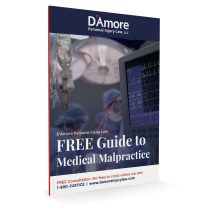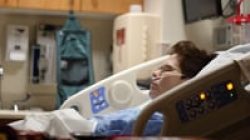D'Amore Personal Injury Law, LLC
Serious Injury Lawyers Proudly Serving
Baltimore, Annapolis, & Washington, D.C.
Improper Monitoring During & After Surgery
Improper monitoring of patients during and after surgery can lead to devastating consequences.
For example: When a patient is not monitored adequately during or after an operation, they may suffer from airway obstruction, respiratory distress, and other complications that could have been prevented had the patient’s care team engaged in proper observation.
In some cases, such as those involving anesthesia errors or improper surgical technique, the patient may suffer permanent disability or even death due to inadequate care.
Consequences of Failing to Monitor
- Muscle strain
- Respiratory complications
- Infections from improper wound care or contamination
Severe potential complications include:
- Organ damage
- Shock
- Cardiac arrest
- Death

Proper Monitoring of Patients
Proper monitoring during and after surgery includes frequent assessments of vital signs, such as heart rate and blood pressure; close observation of the surgical wound or incision site; regular documentation of any relevant findings; and prompt reporting to a physician if any concerning changes are noted.
In addition to routine assessments, post-surgical care should include timely administration of medications as prescribed by the physician and regular follow-up visits with the doctor for detailed evaluations. Patients should also be encouraged to contact their healthcare team if they experience any unusual symptoms such as fever, excessive pain or swelling at the incision site, increased redness around the wound area, drainage from the wound site, dizziness or lightheadedness, difficulty breathing, or chest pains. Seeking follow-up care when appropriate can help prevent major complications, as early detection may allow treatments to be initiated before more serious issues arise.
Within the medical profession, specific standards are in place concerning patient monitoring during and after procedures. These professional standards determine the types of monitoring equipment used during surgery and what type of personnel should observe the patient throughout their time in the operating room. Patient vitals such as heart rate, blood pressure, and oxygen levels must be monitored regularly throughout a procedure.
Discharging a patient too soon after surgery can also be classified as improper monitoring due to the team’s inability to observe potential complications that may arise, such as an adverse reaction to a medication.
Proving Medical Malpractice
When it comes to medical malpractice cases involving improper monitoring of patients in Maryland and Washington, D.C. plaintiffs must present evidence of inadequate care or wrongful acts by medical staff. This task involves proving that providers failed to provide care per professional standards and that physical harm resulted from this failure.
Plaintiffs will need to illustrate how healthcare staff failed to properly observe their condition while in recovery or post-operative care. Additionally, plaintiffs will need to prove the damage was caused due to improperly observed changes in vital signs or other indicators that could have been identified through more frequent monitoring sessions or by other medical personnel engaging in monitoring activities.
It is crucial for medical professionals in Maryland to understand their legal obligations regarding proper patient monitoring protocols before, during, and after surgery. When mistakes or negligence occur and lead to injury or death for a patient undergoing surgery, serious repercussions –professionally and legally – could result from these errors.
Learn about what to do after a Medical Malpractice Injury in our FREE guide.

Claiming Damages
In Maryland and Washington, D.C. anyone who has experienced an injury resulting from medical malpractice related to improper surgical monitoring has legal rights to seek justice and compensation for the harm. This type of medical negligence can range from issues regarding pre-operative assessment and preparation, intra-operative care of the patient, post-operative care, and follow-up treatment.
A patient can pursue a claim for damages when a healthcare provider fails in their duty to exercise reasonable and prudent care while performing surgery. To prove this case, a plaintiff must show that this negligence caused an injury or death that would not have occurred had the healthcare provider exercised the proper level of care. In addition, they must also show that this negligence caused their economic losses in terms of medical bills, lost wages, and other financial losses, as well as non-economic damages such as pain and suffering, inconvenience, and mental anguish.
Filing a Lawsuit
When pursuing such a lawsuit, there are specific steps one must take. First, a victim must provide sufficient evidence that the injury was caused by improper surgical monitoring—before, during, or after the procedure. Second, the patient must prove all necessary elements mentioned above –negligence by a medical provider, causation of harm, and recoverable damages. After these elements are established, the former patient may file a lawsuit.
It is crucial for claimants injured by objects left inside their bodies during surgery to understand that time limits apply for filing these types of malpractice lawsuits. Generally, there is a three year time limit to file a claim. Failing to act within the state’s statute of limitations could prevent victims from recovering compensation for their injuries. Limitations issues are complicated, and discussion of your particular circumstances with an experienced medical malpractice attorney is essential as soon as you suspect you have been a victim.
Statute of Limitations
It is crucial for claimants injured by medical negligence to understand that time limits apply for filing these types of malpractice lawsuits. Generally, there is a three year time limit to file a claim. Failing to act within the state’s statute of limitations could prevent victims from recovering compensation for their injuries. Limitations issues are complicated, and discussion of your particular circumstances with an experienced medical malpractice attorney is essential as soon as you suspect you have been a victim.
Medical Malpractice Attorneys in Maryland and Washington, D.C.
If you or a loved one were harmed from an object left behind during surgery, you may have a case for medical malpractice. The skilled attorneys at D’Amore Personal Injury Law will provide you with a free evaluation of your case and advise you of your legal rights. There are never any out-of-pocket costs to you unless they win your case. Reach out today at 410-324-2000 to schedule a free consultation.
RELATED ARTICLES
FREE Case Consultation
Fill out the form below and we will contact you.
Or, give us a call at

